英语谚语翻译初探
英语谚语带翻译30条
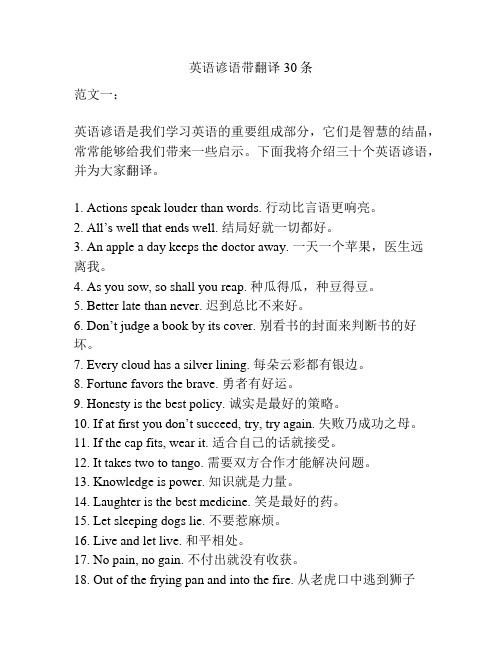
英语谚语带翻译30条范文一:英语谚语是我们学习英语的重要组成部分,它们是智慧的结晶,常常能够给我们带来一些启示。
下面我将介绍三十个英语谚语,并为大家翻译。
1. Actions speak louder than words. 行动比言语更响亮。
2. All’s well that ends well. 结局好就一切都好。
3. An apple a day keeps the doctor away. 一天一个苹果,医生远离我。
4. As you sow, so shall you reap. 种瓜得瓜,种豆得豆。
5. Better late than never. 迟到总比不来好。
6. Don’t judge a book by its cover. 别看书的封面来判断书的好坏。
7. Every cloud has a silver lining. 每朵云彩都有银边。
8. Fortune favors the brave. 勇者有好运。
9. Honesty is the best policy. 诚实是最好的策略。
10. If at first you don’t suc ceed, try, try again. 失败乃成功之母。
11. If the cap fits, wear it. 适合自己的话就接受。
12. It takes two to tango. 需要双方合作才能解决问题。
13. Knowledge is power. 知识就是力量。
14. Laughter is the best medicine. 笑是最好的药。
15. Let sleeping dogs lie. 不要惹麻烦。
16. Live and let live. 和平相处。
17. No pain, no gain. 不付出就没有收获。
18. Out of the frying pan and into the fire. 从老虎口中逃到狮子口中。
英语谚语大全带翻译 常用
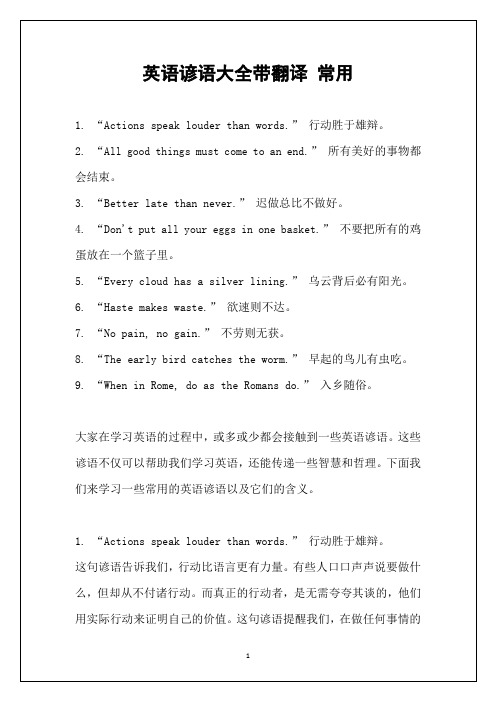
这句谚语告诉我们,不要把所有的希望都寄托在一个地方。人生充满了不确定性,把所有的希望都寄托在一个地方很容易导致失败。我们应该学会多样化投资,让自己的生活更加稳固。
5. “Every cloud has a silver lining.” 乌云背后必有阳光。
英语谚语大全带翻译 常用
1. “Actions speak louder than words.” 行动胜于雄辩。
2. “All good things must come to an end.” 所有美好的事物都会结束。
3. “Better late than never.” 迟做总比不做好。
4. “Don't put all your eggs in one basket.” 不要把所有的鸡蛋放在一个篮子里。
这句谚语告诉我们,任何困难和挫折都会迎来一个好的结果。它提醒我们,即使眼前的困境让人感到沮丧,但只要我们坚持下去,一定会迎来好的转机。这句谚语对我们的人生和事业都有着重要的启示,即使遇到困难,也不要放弃,因为困难并不会永远存在。
6. “Haste makes waste.” 欲速则不达。
这句谚语告诉我们,匆忙行事往往会导致浪费。有时候我们为了赶时间,容易犯错或者做出不理智的决定。这句谚语提醒我们,不要为了速度而放弃质量,要学会守时和耐心地完成任务,这样才能取得更好的成果。
这句谚语告诉我们,所有美好的时光,所有美好的事物都会终结。它提醒我们要珍惜眼前的一切,因为它们都将会逝去。人生如此短暂,我们应该懂得珍惜眼前所拥有的一切,不要把时间浪费在无谓的争吵和抱怨上。
英语谚语大全带翻译100句大全
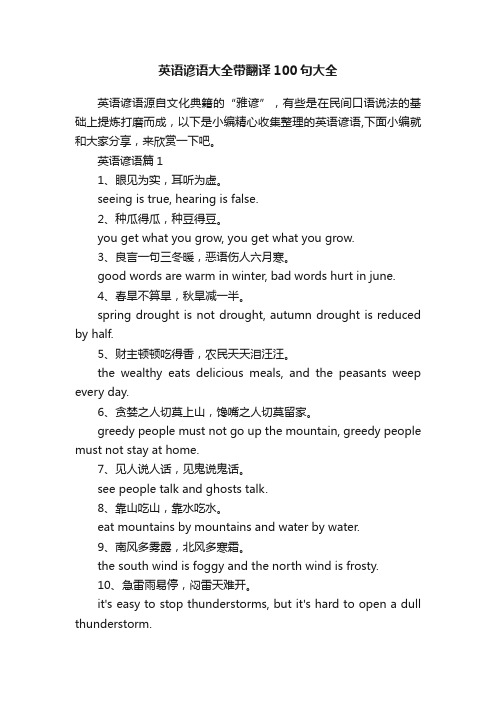
英语谚语大全带翻译100句大全英语谚语源自文化典籍的“雅谚”,有些是在民间口语说法的基础上提炼打磨而成,以下是小编精心收集整理的英语谚语,下面小编就和大家分享,来欣赏一下吧。
英语谚语篇11、眼见为实,耳听为虚。
seeing is true, hearing is false.2、种瓜得瓜,种豆得豆。
you get what you grow, you get what you grow.3、良言一句三冬暖,恶语伤人六月寒。
good words are warm in winter, bad words hurt in june.4、春旱不算旱,秋旱减一半。
spring drought is not drought, autumn drought is reduced by half.5、财主顿顿吃得香,农民天天泪汪汪。
the wealthy eats delicious meals, and the peasants weep every day.6、贪婪之人切莫上山,馋嘴之人切莫留家。
greedy people must not go up the mountain, greedy people must not stay at home.7、见人说人话,见鬼说鬼话。
see people talk and ghosts talk.8、靠山吃山,靠水吃水。
eat mountains by mountains and water by water.9、南风多雾露,北风多寒霜。
the south wind is foggy and the north wind is frosty.10、急雷雨易停,闷雷天难开。
it's easy to stop thunderstorms, but it's hard to open a dull thunderstorm.11、沟泥、河泥、水杂草,都是省钱好料。
英语谚语翻译研究报告

英语谚语翻译研究报告Research Report on English Proverbs TranslationIntroductionProverbs are traditional sayings that express a truth or a piece of wisdom. They are an important part of a country's culture and language. When translating proverbs from one language to another, it is essential to consider the meaning, usage, and cultural implications of the proverb. This research report aims to analyze the challenges and strategies involved in translating English proverbs into Chinese.Problems in Translating English ProverbsTranslating proverbs across languages poses several challenges. Firstly, proverbs often rely heavily on cultural references, making them difficult to understand for speakers of another language. For example, the English proverb "Don't count your chickens before they hatch" may not make sense to Chinese speakers who are not familiar with the concept of hatching chickens. Secondly, proverbs often use figurative language and metaphors that may not have direct equivalents in the target language. For instance, the English proverb "Actions speak louder than words" may require a complete restructuring of the idiom to convey the same meaning in Chinese. Translation StrategiesTo overcome these challenges, translators can employ various strategies. Firstly, translators can retain the original form of the proverb, providing a literal translation accompanied by an explanation of its meaning. This approach helps to maintain the cultural authenticity of the proverb while ensuring comprehensionfor the target audience. For example, the English proverb "One man's meat is another man's poison" can be translated literally as "一个人的肉是另一个人的毒药," followed by an explanation ofits intended meaning.Another strategy is to find an equivalent proverb that carries a similar meaning in the target language. This requires a deep understanding of both the source and target languages. For instance, the English proverb "Too many cooks spoil the broth" could be translated into Chinese as "厨师太多,汤坏了" which conveys the same idea of how too many people can ruin a task.ConclusionTranslating English proverbs into Chinese involves understanding the cultural background, metaphorical significance, and intended meaning of the proverb. Translators need to choose the most appropriate strategy for each proverb to ensure that its essence is retained in the target language. Literal translations can preserve cultural authenticity, while finding equivalent proverbs can help convey the same meaning in a different cultural context. By understanding the challenges and employing appropriate translation strategies, translators can effectively bridge the linguistic and cultural gaps between English and Chinese proverbs.。
常用英语谚语大全100条带翻译
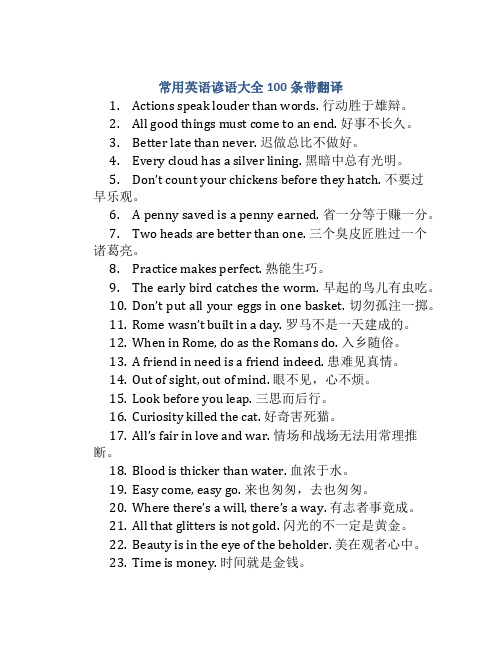
常用英语谚语大全100条带翻译1.Actions speak louder than words. 行动胜于雄辩。
2.All good things must come to an end. 好事不长久。
3.Better late than never. 迟做总比不做好。
4.Every cloud has a silver lining. 黑暗中总有光明。
5.Don’t count your chickens before they hatch. 不要过早乐观。
6. A penny saved is a penny earned. 省一分等于赚一分。
7.Two heads are better than one. 三个臭皮匠胜过一个诸葛亮。
8.Practice makes perfect. 熟能生巧。
9.The early bird catches the worm. 早起的鸟儿有虫吃。
10.Don’t put all your eggs in one basket. 切勿孤注一掷。
11.Rome wasn’t built in a day. 罗马不是一天建成的。
12.When in Rome, do as the Romans do. 入乡随俗。
13.A friend in need is a friend indeed. 患难见真情。
14.Out of sight, out of mind. 眼不见,心不烦。
15.Look before you leap. 三思而后行。
16.Curiosity killed the cat. 好奇害死猫。
17.All’s fair in love and war. 情场和战场无法用常理推断。
18.Blood is thicker than water. 血浓于水。
19.Easy come, easy go. 来也匆匆,去也匆匆。
20.Where there’s a will, there’s a way. 有志者事竟成。
浅析英语谚语的特点及翻译技巧-2021年精选文档
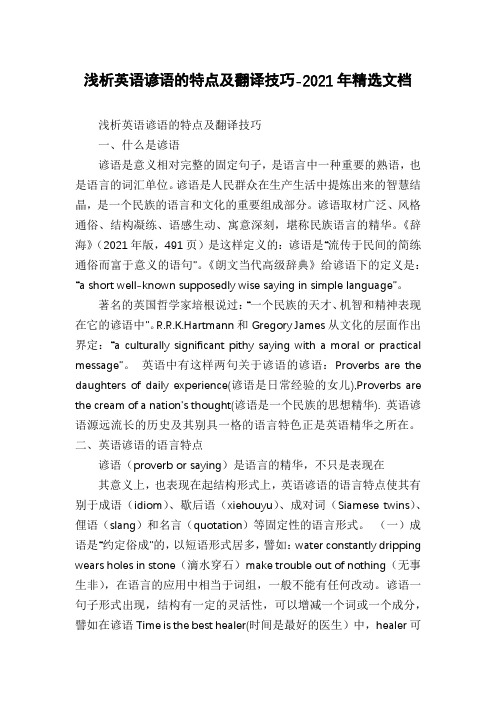
浅析英语谚语的特点及翻译技巧-2021年精选文档浅析英语谚语的特点及翻译技巧一、什么是谚语谚语是意义相对完整的固定句子,是语言中一种重要的熟语,也是语言的词汇单位。
谚语是人民群众在生产生活中提炼出来的智慧结晶,是一个民族的语言和文化的重要组成部分。
谚语取材广泛、风格通俗、结构凝练、语感生动、寓意深刻,堪称民族语言的精华。
《辞海》(2021年版,491页)是这样定义的:谚语是“流传于民间的简练通俗而富于意义的语句”。
《朗文当代高级辞典》给谚语下的定义是:“a short well-known supposedly wise saying in simple language”。
著名的英国哲学家培根说过:“一个民族的天才、机智和精神表现在它的谚语中”。
R.R.K.Hartmann和Gregory James从文化的层面作出界定:“a culturally significant pithy saying with a moral or practical message”。
英语中有这样两句关于谚语的谚语:Proverbs are the daughters of daily experience(谚语是日常经验的女儿),Proverbs are the cream of a nation's thought(谚语是一个民族的思想精华). 英语谚语源远流长的历史及其别具一格的语言特色正是英语精华之所在。
二、英语谚语的语言特点谚语(proverb or saying)是语言的精华,不只是表现在其意义上,也表现在起结构形式上,英语谚语的语言特点使其有别于成语(idiom)、歇后语(xiehouyu)、成对词(Siamese twins)、俚语(slang)和名言(quotation)等固定性的语言形式。
(一)成语是“约定俗成”的,以短语形式居多,譬如:water constantly dripping wears holes in stone(滴水穿石)make trouble out of nothing(无事生非),在语言的应用中相当于词组,一般不能有任何改动。
常见的英语谚语带翻译
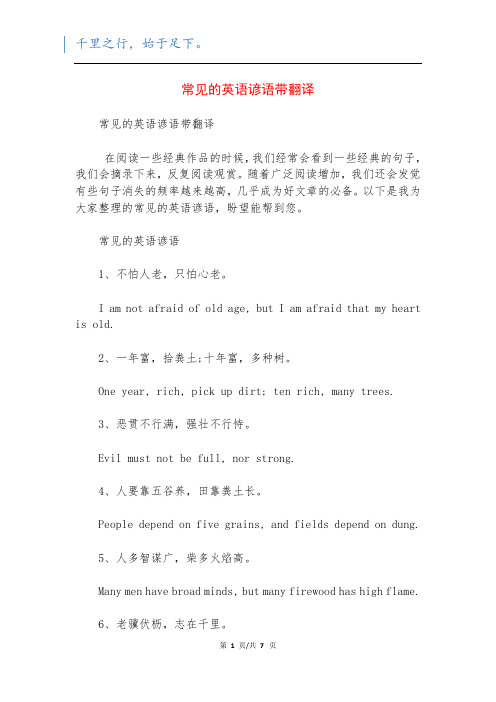
常见的英语谚语带翻译常见的英语谚语带翻译在阅读一些经典作品的时候,我们经常会看到一些经典的句子,我们会摘录下来,反复阅读观赏。
随着广泛阅读增加,我们还会发觉有些句子消失的频率越来越高,几乎成为好文章的必备。
以下是我为大家整理的常见的英语谚语,盼望能帮到您。
常见的英语谚语1、不怕人老,只怕心老。
I am not afraid of old age, but I am afraid that my heart is old.2、一年富,拾粪土;十年富,多种树。
One year, rich, pick up dirt; ten rich, many trees.3、恶贯不行满,强壮不行恃。
Evil must not be full, nor strong.4、人要靠五谷养,田靠粪土长。
People depend on five grains, and fields depend on dung.5、人多智谋广,柴多火焰高。
Many men have broad minds, but many firewood has high flame.6、老骥伏枥,志在千里。
There is a long way to go.7、若要好,大让小。
If we are good, let us be small.8、好男不争财和产,好女不争嫁时衣。
Good men do not fight for wealth and production.9、糊涂须究竟,聪慧莫过头。
Muddleheaded must be smart.10、人各有心,心各有见。
Every man has his heart, and his heart sees each other.11、虎不怕山高,雨不怕水深。
Tigers are not afraid of mountains, but rain is not afraid of water.12、宁走十步远,不走一步险。
英语谚语带翻译经典10篇
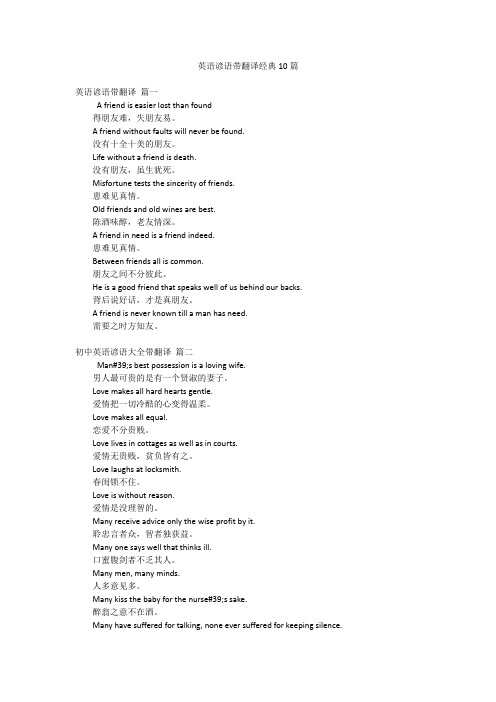
英语谚语带翻译经典10篇英语谚语带翻译篇一A friend is easier lost than found得朋友难,失朋友易。
A friend without faults will never be found.没有十全十美的朋友。
Life without a friend is death.没有朋友,虽生犹死。
Misfortune tests the sincerity of friends.患难见真情。
Old friends and old wines are best.陈酒味醇,老友情深。
A friend in need is a friend indeed.患难见真情。
Between friends all is common.朋友之间不分彼此。
He is a good friend that speaks well of us behind our backs.背后说好话,才是真朋友。
A friend is never known till a man has need.需要之时方知友。
初中英语谚语大全带翻译篇二Man#39;s best possession is a loving wife.男人最可贵的是有一个贤淑的妻子。
Love makes all hard hearts gentle.爱情把一切冷酷的心变得温柔。
Love makes all equal.恋爱不分贵贱。
Love lives in cottages as well as in courts.爱情无贵贱,贫负皆有之。
Love laughs at locksmith.春闺锁不住。
Love is without reason.爱情是没理智的。
Many receive advice only the wise profit by it.聆忠言者众,智者独获益。
Many one says well that thinks ill.口蜜腹剑者不乏其人。
- 1、下载文档前请自行甄别文档内容的完整性,平台不提供额外的编辑、内容补充、找答案等附加服务。
- 2、"仅部分预览"的文档,不可在线预览部分如存在完整性等问题,可反馈申请退款(可完整预览的文档不适用该条件!)。
- 3、如文档侵犯您的权益,请联系客服反馈,我们会尽快为您处理(人工客服工作时间:9:00-18:30)。
英语谚语翻译初探英语谚语翻译初探一引言德国学者赛勒尔在《德国谚语(proverb)学》中认为“谚语(p roverb)是在民间流传的、具有诲人倾向和高雅形式的独立语句。
”作为英国人民长期的生产和生活经验教训的总结,英语(E nglish)谚语(proverb)早已成为英语(English)语言文化的一个重要组成部分。
这些谚语(proverb),有的寓意深刻、充满智慧;有的短小精悍、生动活泼;有的琅琅上口、易诵易记。
的确,英语(English)谚语(proverb)具有深刻的哲理、简洁的用词、和谐的语调及鲜明的形象等诸多特征,充满思想智慧和语言艺术的光彩,具有深厚的文化积淀。
翻译是科学,因为它涉及思维和语言,反映了存在与认识、主体与客体的关系;翻译是艺术,因为它是译者对原文进行再创造的过程;翻译是技能,因为译文的信息需用译语以恰当的方式再现(陈宏薇,1998) 。
对英语(English)谚语(pro verb)比喻结构的研究和翻译恰恰是翻译的科学性、艺术性和技能性的结合与体现。
英语(English)和汉语(Chinese)中存在大量的谚语(prover b)。
谚语(proverb)一般是民间流传于口头的语言,一般短小精悍,是人们生活经验,生活智慧的结晶。
寓意深刻,生动活泼,朗朗上口,是语言中的精华,是历史文化的积淀。
在翻译英语(E nglish)谚语 (proverb)的时候要表达出英语(English)谚语(pr overb)的修辞,意思以及韵律,实为不易。
二实证研究广义地说,英语(English)的比喻结构包括明喻、暗喻、换喻、换喻和拟人等。
本文从比喻这一修辞格的角度,再结合翻译理论从五个方面来研究英语(English)谚语(proverb)诸多特点。
1 、明喻(Simile) ,就是把本体(tenor) 和喻体(vehicle) 通过比喻词(like , as , than , and , the same 等) 联系起来。
亦即把甲事物直接比作乙事物,以便使事物的形象更加生动、逼真说理更加透彻,更加具有说服力。
一般说来,英语(English)谚语(proverb)的明喻结构最好的翻译方法是直译(word - for - word translation) ,即在不违背译文语言规范以及不引起错误的联想的条件下,在译文中保留英语(English)谚语(proverb)原有的色彩与形象。
这是英语(En glish)谚语(proverb)汉译的最常用方法。
一般用“如同,就象”或直接用“是”之类的汉语(Chinese)句式翻译。
例如:A man of words and not of deeds is like a garden fu ll ofweeds.只说不做的人,犹如光长野草的花园。
Living without an aim is like sailing without a com pass.无目标的生活,就象无罗盘的航行。
An honest man’s word is as good as his bond.诚实人的诺言,如同他立下的契约一样可靠。
A home without love is no more than a body without asoul.没有爱的家庭就象一个没有灵魂的躯体。
Truth and rose have thorns about them.真理象玫瑰那样多刺。
值得注意的是,有些英语(English)谚语(proverb)的明喻结构既可直译, 又可意译(free translation) ,即在不可能或没必要保留原有表达形式时,摆脱字面意义或形式的方法。
这些谚语(proverb)译成汉语(Chinese)时可用汉语(Chinese)的并列结构表示。
例如:Lovers live by love as larks live by leeks.云雀靠韭葱生活,情侣靠爱情生活。
Old friends and old wine are best .陈酒味醇,老友情深。
A good name is rather to be chosen than great riche s.宁要美名,不要巨富。
另外,有些英语(English)谚语(proverb)的明喻结构在翻译时还可以套用汉语(Chinese)谚语(proverb)。
尽管英汉两种语言文化有很大差异,但人们对有些事物的理解和看法往往有相同、甚至是不谋而合的,因此,英汉两种语言有着大致相同的比喻和形象,表达的意义几乎相同。
如果直译,用“犹如,就象”之类的汉语(Chinese)句式,反而显得罗嗦。
再者,受“中庸”哲学思想的影响,中国人的美学观念中特别强调平衡美,除了极为频繁地使用对仗这一修辞格,还大量使用四字词组。
例如:Too swift arrives as tardy as too slow.欲速则不达。
A word and a stone let go cannot be recalled.一言既出,驷马难追。
A miss is as good as a mile.差之毫厘,失之千里。
The water that bears the boat is the same that swal lows itup.水能载舟,亦能覆舟。
2 、暗喻(Metaphor) ,也叫隐喻,是一种含蓄的比较。
它与明喻稍有不同,就是说本体与喻体无需比喻词而直接联系起来,即把本体直接说成喻体。
通常,英语(English)谚语(proverb)的暗喻结构最好的翻译方法是直译,用“如同,就象”或直接用“是”之类的汉语(Chin ese)句式翻译。
例如:Zeal without knowledge is fire without light .没有知识的热心,如同没有光的火。
Deeds are fruits , words are leaves.行动是果实,言语是叶子。
Life is not a bed of roses.生活并非玫瑰花床。
(人生并非一帆风顺。
)All that glitters is not gold.所有闪闪发光的未必都是黄金。
Speech silver , silence is golden.雄辩是银,沉默是金。
Plain dealing is a jewel.光明磊落是瑰宝。
Time is money.时间就是金钱。
(一寸光阴一寸金。
)暗喻的使用,使得英语(English)谚语(proverb)具体生动,形象鲜明;其论理恰到好处,论事明白易懂,起到了警醒人、教育人的功效。
有趣的是,前辈在翻译Time is money 时,不主张套用“一寸光阴一寸金”。
理由是谚语(proverb)Time is money. “ ??宣扬功利主义,带有资产阶级的铜臭味”(曾自立,1983) 。
而今天,人们不再持此态度了,足见英语(English)谚语(proverb)翻译时的语用意义的变迁,地方文化色彩转变。
3 、换喻(Metonymy)换喻指某一事物改由属性或与之有密切关系的事物来表示。
也叫转喻,即对某一事物不直呼其名,而用另一与之有密切关联的事物来代替它。
也有的书本称“换喻”为“借代”。
换喻的一个重要特征是其联想意义。
这类谚语(proverb)翻译时既可直译,又可意译,还可以套用汉语(Chinese)谚语(proverb),但要加注或加以解释,否则译语的读者因为语言文化的巨大差异,难以理解,无法产生联想。
例如:Caesar’s wife must be above suspicious.身为恺撒妻,务必无可疑。
(恺撒是古罗马著名将军,其妻与某一案件有牵连,遭其遗弃,以证明自己与犯罪无关。
Caesar’s wife 被用来比喻a person who has close rel ationshipwith a great man 与伟人关系很近人。
) Who keeps company with the wolf , will learn to how l.跟狼在一起,就会学会狼叫。
(这里的wolf 狼在英语(Engli sh)中代指an evil person 坏人) 。
No cross , no crown.不经苦难,哪来胜利? (cross 在基督教里代表十字架,也代表耶酥基督, 《圣经》中记载耶酥基督力经磨难,钉死在十字架上。
crown 在英语(English)里代表王冠,是胜利的象征。
) If a donkey brag at you , don’t brag at him.别和蠢人一般见识。
(这里的donkey 驴子在英语(English)中暗含a foolish person 愚蠢的人之意,因此,一提到donkey 就会使人联想到fool 蠢人。
该谚语(proverb)就是借用donkey 来代指fool 。
)Homer sometimes nods.智者千虑,必有一失。
(我们知道,Homer 荷马是古希腊著名诗人,也是wise man 智者的代名词,这里借用Homer 来代指wis e man ,生动地说明了“人有失错,马有失蹄”这一道理。
)Rome was not built in a day.冰冻三尺,非一日之寒。
(该谚语(proverb)也经常直译为“罗马不是一天建成的”, 其中Rome 代指宏伟事业、伟大成就。
这句谚语(proverb)教导我们:要成就大业,既需要时间,又需要有锲而不舍的精神。
)4 、代喻(Synecdoche) 又称举偶,它是以部分代替全部或全体代替部分的一种修辞手法。
这类谚语(proverb)翻译时,往往采用意译的方法。
例如: Many hands make light work.人多好办事。
Many hands make quick work.人多办事快。
Two heads are better than one.二人智慧胜一人。
Great minds think alike.英雄所见略同。
这些在英语(English)中表示人体某一部分的单词:hands 手,heads头,和minds 大脑,都被用来代替people 人,就是用部分来代替全部。
翻译的时候一定要注意译语( target language)和原语(source language) 使用的语言的不同之处,采用汉语(Chinese)常用的表达方式,以便翻译得恰如其分,为汉语(Chine se)读者所理解和接受。
5 、拟人(Personification)实际上,拟人也是一种比喻,即把无生命的事物或抽象概念看成有生命的东西来加以谈论。
在翻译时一般可以套用汉语(Ch inese)谚语(proverb),没有合适的同义习语套用时,则采取直译或意译的方法。
